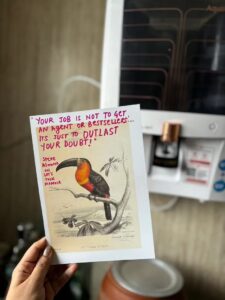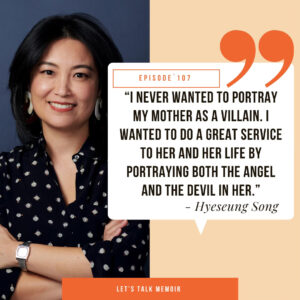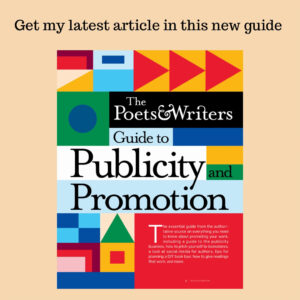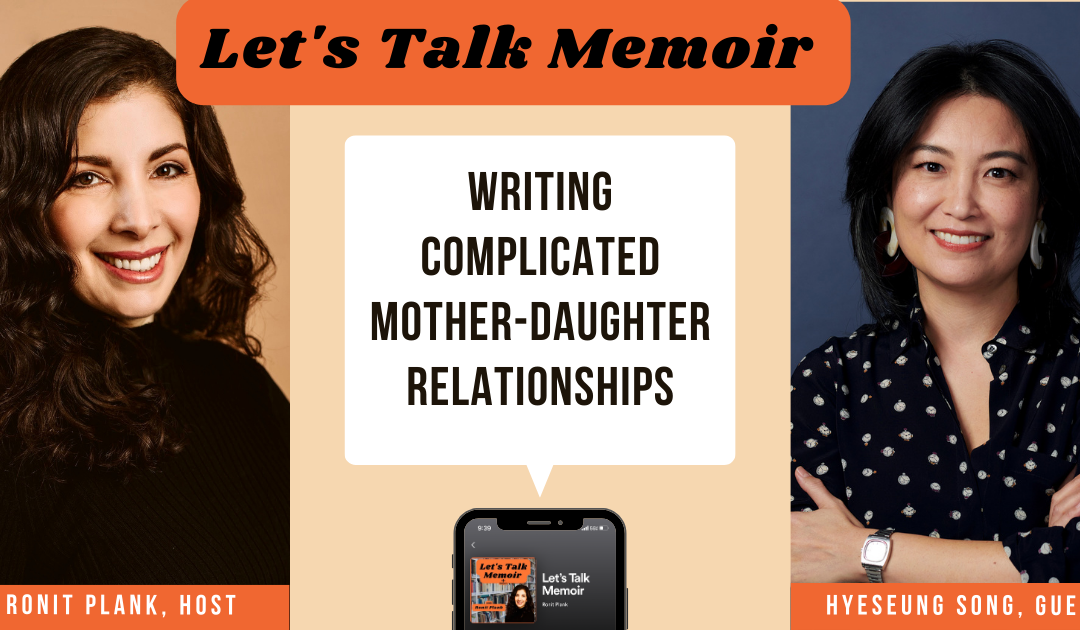Your memoir is your memoir because of the way you make sense of what has occurred. This is why I suggest writing as far as you can on your own before inviting loved ones into your space.
 “Your job is not to get an agent or bestseller, It’s to outlast your doubt.” -Steve Almond on Let’s Talk Memoir Ep. 94
“Your job is not to get an agent or bestseller, It’s to outlast your doubt.” -Steve Almond on Let’s Talk Memoir Ep. 94
I’ve been thinking about how writing helps us understand ourselves, process experience, and especially in the case of memoir, can be a testament to how we have survived. To write is to build rich worlds within us and around us, pull them close like our most familiar blanket. The more we fortify them, they fortify us and yet, we can so easily get derailed when we start thinking about book sales and platform, productivity, and reviews. There’s nothing that shocks me out of my creative process quite like feeling I’m failing at that “measurable” analytics stuff.
We each have our reasons for choosing a writing life and I’ve learned to steady and center myself by remembering why I turned to this craft so many years ago. I needed to express what was inside of me, understand better what it meant, and find an effective way to convey that. When I do any of those three things I feel a validation that lifts me; if I achieve all three, I feel like a writer.
Probably the most important lesson I’ve learned in the last fifteen years is how important it is to be in conversation with other writers and build community with them. Raju Tai and I connected here on Substack when she sent me this photo above of a quote she wrote down while listening to my interview with Steve Almond about his newest book Truth is the Arrow, Mercy is the Bow: “Your job is not to get an agent or bestseller, it’s to outlast your doubt”.
This quote buoyed me when Steve and I were recording his episode and when I saw that it also buoyed Raju I asked her if I could share her photo in my next newsletter. Raju and I haven’t gotten to meet in person yet, we live far from each other, but now she is part of my writing community and I am leaning more about hers. Thank you Raju! You can check out her Substack Creative Resilience and subscribe here.
Your Memoir Questions Answered
During my recent Memoir Ask-Me-Anything with my guest Hannah Sward who wrote the memoir Strip, we discussed writing about recovery and addiction in memoir. We were also able to answer many attendee questions during our hour together, but one of the questions we didn’t have time for was from Amethyst Loscocco who asked:
Do you recommend interviewing family members about events? And at what point in the process? I had seven siblings, some now estranged, and they will all disagree on what happened during our childhood.
Thank you for this question, Amethyst, it’s an important one and comes up for memoirists frequently. As with most memoir-writing considerations, this is your personal decision, and while I will offer some ideas here, please always listen to your gut and follow your instincts. No two stories or memoirists are the same and you must honor what feels right to you.
If you have family members willing to talk to you and doing so won’t put you under an enormous strain or interfere with your own sense of agency in telling the story you need to, I say give it a try. You never know what you’ll learn, and reflecting on these new anecdotes and histories as both character-you and narrator-you can bring fresh depth and nuance to your pages.
I recommend reaching out to family after you’ve written for a while so your manuscript is well underway before you open the door to outside opinions, feedback, and possible judgment. That’s what I did when I was writing my memoir When She Comes Back.
Not everyone likes combing through the past, excavating history, and potentially kicking up dust, and so you might get resistance and that could make your writing process more fraught. Your job as a writer (as mentioned above) is to outlast your doubt, so the more protected you feel while generating material, the better.
You can check out this article I wrote for Writer’s Digest about how to approach friends and family about your memoir and here are some considerations should you decide to bring your questions and project to loved ones:
Siblings often remember the past differently, even when it comes to simple, everyday events. We all have a unique lens and approach to existing in the world which deeply informs what we notice, what we don’t, and what we can’t stop thinking about decades later. Our siblings might not recall us standing right next to them when they broke that one-of-a-kind family heirloom in our childhood home, but that is likely because our sib was fight, flight, or freezing and didn’t have the bandwidth left to see us there in the room or register our reaction.
But just because someone can’t validate what you went through or how you experienced it doesn’t mean it didn’t happen or that it didn’t affect you the way it did. Your memoir is your memoir because of the way you make sense of what has occurred. This is why I suggest writing as far as you can on your own before inviting loved ones into your space.
Also important to keep in mind is how what we remember is always changing. As my guest on Let’s Talk Memoir Dr. Virginia Campbell shared on episode 15, “every time you remember something you actually recreate the memory”. I was surprised and fascinated to learn there is no such thing as objective truth when it comes to memory.
What’s more, trauma can deeply affect memory and recall. As my guest Lisa Cooper Ellison explained when she joined me on episode 86 of Let’s Talk Memoir, “memories are very malleable so we can’t rely on capital “T” truth to come out of memories but that doesn’t mean your memory is not true.” I loved talking with Lisa and hers is an excellent episode to listen to learn more about memory, trauma and our trauma responses.
Remember, what you remember and how you are remembering helps to show you what matters to you, the memoirist; it helps make your story uniquely yours.
Thank you for this question, Amethyst. I hope this offers you some helpful guidance.
If you have a question you’d like me to address in an upcoming newsletter, you can message me here or find me on my Instagram.
Latest on the podcast
Hyeseung Song is my most recent guest on Let’s Talk Memoir who joined me for a conversation about Writing Complicated Mother-Daughter Relationships. We talked about her “beautiful but domineering mother”, intergenerational trauma and engaging with pain, gaining the distance and time necessary to tell our stories, and her memoir Docile: Memoirs of a Not-So-Perfect Asian Girl. Hyeseung was so insightful about her writing process and the time she needed to complete Docile. You can listen to this episode here.

“I never wanted to portray my mother as a villain. I wanted to do a great service to her and her life by portraying both the angel and the devil in her.” -Hyeseung Song, Let’s Talk Memoir Ep. 107
Also on the pod
The Toxicity of Shame featuring Meg Kissinger who talked with me about losing two siblings to suicide, using her skills as a journalist on her own family, America’s failed mental health system, and her new memoir While You Were Out: An Intimate Family Portrait of Mental Illness in an Era of Silence. Listen to our conversation here.
Be sure to tune in this Tuesday 7/30 when Sonya Huber joins me for the second time on Let’s Talk Memoir!
Resources
- If you’d like news on upcoming Memoir Ask-Me-Anythings and my workshops, be sure to subscribe to this Substack.
- My article “Set Your Pitch Apart: Getting Indie Bookstores to Say Yes to Your Book Event” is now available as part of the Poets & Writers Guide to Publicity and Promotion. You’ll get my article along with many other helpful articles with strategies for getting you and your work in front of readers. This PDF requires Adobe Acrobat and is $4.99. You can purchase it here.

I hope July has been good to you so far and you are finding time to rest a bit and nurture your creativity in whatever ways that feed you. New episodes of Let’s Talk Memoir are dropping every Tuesday and I’ll have a season 5 announcement soon!
xo,


